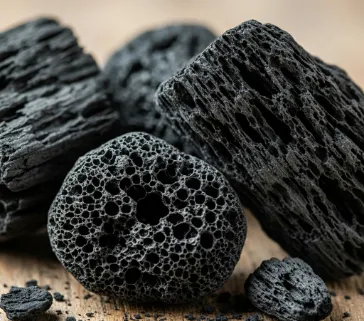Biochar is a carbon-rich, lightweight, and porous natural material produced from crop residues using a special thermal process called pyrolysis. It is used in agriculture to address several problems and improve soil quality.
What is Biochar?
Biochar is made by burning crop residues in low-oxygen conditions, resulting in a porous material that can be added to soil to boost its water retention, fertility, and beneficial microorganism population.

Benefits of Biochar in Agriculture
- Biochar’s porous structure helps the soil retain moisture for longer periods, which means crops need less water and can withstand drought better.
- It improves soil fertility by helping nutrients stay available for plants, making fertilizer use more efficient and providing a home for helpful soil microbes.
- Biochar helps to permanently improve soil structure, allowing roots to grow deeper and stronger.
- Using biochar can lower farming costs and increase yields, as it makes land more fertile over time.
- Instead of burning crop residues and causing pollution, those residues are converted to biochar—a climate-friendly solution.
Real-World Results
Farmers in regions like Madhya Pradesh and Gujarat who adopted biochar reported a yield increase of up to 32%, with an average improvement of 25%.
How to Use Biochar
Correct usage of biochar in farming can enhance productivity and soil health. For practical advice, farmers can seek more information through agricultural extension channels or related online resources.
Summary:
Biochar is an agricultural innovation produced from plant residue by pyrolysis, boosting soil fertility, water retention, and crop yield, while reducing farming costs and combating climate change.
References
- GYAN विज्ञानं
- What is Biochar? | बायोचार कृषि उत्पादन बढ़ाने में कैसे मदद करता है?
- Meaning of Biochar in Hindi – Translation – Hinkhoj
- Welcome To Swami Kheswanand Rajashan Agriculture University
You May Also Like
- जैव विविधता (Biodiversity): महत्व, प्रकार, संरक्षण और भारत में स्थिति
- Artificial Intelligence to Be Taught in Indian Schools from Class 3 Starting 2026
- Zoho Arattai App with Zia AI and Enhanced Privacy Features Challenges WhatsApp
- Zoho Arattai The 20 Year Tech Journey Behind India’s Swadeshi Messaging App
- Nobel Prize Winners 2025: नोबेल पुरस्कार 2025 की पूरी जानकारी हिंदी में


